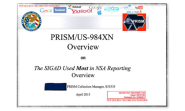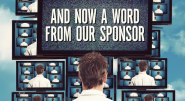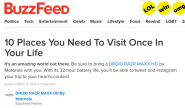-
About
- About Listly
- Community & Support
- Howto
- Chrome Extension
- Bookmarklet
- WordPress Plugin
- Listly Premium
- Privacy
- Terms
- DMCA Copyright
- © 2010-2024 Boomy Labs


Note who's missing in Tanzina Vega's New York Times story today about the monster merger of ad agencies Publicis and Omnicom. Media - TV, radio, magazines, newspapers, online - are nowhere to be seen. This merger, they all say, is about the ad agencies joining together to defend at the 11th hours against the real behemoth in the business, Google, as well as Facebook and Twitter.

When people ask me for someone smart who's doing innovate and successful things in magazines, I scan the known world and always end up at the same place: Justin Smith, who just announced that he is leaving Atlantic Media to become CEO of Bloomberg's media group.

Google just demoted your television set into a second screen, a slave to your phone or tablet or laptop. With the $35 Chromecast you can with one click move anything you find on your internet-connected device - YouTube video, Netflix, a web page as well as music and pictures and soon, I'd imagine, games - onto your big TV screen, bypassing your cable box and all its ridiculous and expensive limitations.

At the Guardian's Activate conference in London, which I emceed, I brought mirth with a demonstration of Google Glass. Thank goodness they edited out my many unsuccessful attempts to get the camera to take a picture of a QR code on my phone so I could pair Glass with it and show the audience what I was seeing on the big screen.

The Guardian asked me to respond to the issues raised in Yochai Benkler's testimony at the trial of Bradley Manning about the definition of journalism. I'm cross-posting it here for archival purposes. To comment, please go to the Guardian.

There are no journalists, there is only the service of journalism. Yes, I know that in condensed form, that may sound like a parodic tweet. But please consider the idea. Thanks to the Snowden-Greenwald NSA story, we are headed into another spate of debate about who is and isn't a journalist.

Jay Rosen wrote an insightful post forking the practice of journalism into "politics: none" (that is, traditional American journalism: objective, it thinks) and "politics: some" (that is, the kind just practised by Glenn Greenwald and the Guardian). Jay catalogs the presumptions and advantages of each.

Now that I've written my commuter's paean to Waze, allow me to get a bit journowonky now and examine some of the lessons newspapers should learn from the success of the service: 1. Waze built a platform that lets the public share what it knows without the need for gatekeepers or mediators - that is, media.

I've had to learn to trust Waze in a few traffic jams. Now every time Waze tells me to turn, I turn. I've missed horrendous traffic jams that way. I've learned new routes to work and home I'd never imagined. I've seen parts of the countryside that are new to me.

America is supposed to be a nation governed by principles, which are undergirded by the Constitution and the Bill of Rights and carried into law. The discussion about the government and its capture of our data should be held on the level of principles.

The Sun-Times was wrong and right when it fired its entire photo department. Wrong: Images are more important than ever. Look at this page: Medium practically forces us to include a photo with every post. On Google+ posts sans images get little love.

I need to show someone how Repost.US allows a blogger or publisher to embed an entire article - with the creator's brand, advertising, analytics, and links - in a site. Thailand trims interest rate as economy cools (via AFP) Thailand on Wednesday cut its benchmark interest rate by 0.25 percentage points, the first reduction in seven months, after the domestic economy contracted in the first quarter of the year.

We used to know what ads were. They had borders around them - black lines in print, a rare millisecond of dead air on TV, the moment when the radio host's voice became even friendlier, letting us know he was now being paid to peddle.

I just saw some mind-bending work Chartbeat is about to release about measuring the time users spend exposed to an ad online. As background, to quote Chartbeat CEO Tony Haile: "Chartbeat monitors activity by checking in with users every second and looking for signals (mouse movement, key strokes, etc) that show they are actively consuming the content in front of them.

Howard Kurtz screwed up, yes, but he also just showed an admirable example of accountability in apologizing on his CNN show Reliable Sources - saying that as a media critic he should be held to a higher standard of media trust - and then submitting to grilling by David Folkenflik of NPR and Dylan Byers of Politico.

I didn't know until this week's Howard Kurtz kerfuffles that I was even listed as a member of the advisory board to his Daily Download. I did indeed give some advice to Kurtz and Lauren Ashburn a few years ago, before the site's launch, in a half-hour phone call as I headed to JFK one day.

I often tell my students that where they see a problem, they should find the opportunity. Well, we've been told over and over this weekend that we had a big problem with misinformation after the Boston Marathon bombing. Breaking news, haven't you heard, is broken. So I see an opportunity, a big journalistic opportunity.

The attack on the Boston Marathon was designed to maximize media coverage: a popular event with cameras everywhere and a narrative that will be sure to follow about innocent enjoyment henceforth ruined by danger. For years, we've been told to fear this: an attack on a football game or at Disneyland or in a mall, someplace without fear before.

Disconnect thinks it is a film about technology's impact on our lives. But it is really just a mawkish melodrama about a random bunch of creeps, jerks, assholes, and loners. It is not a warning about our future. In the future, it will be seen as the cyber Reefer Madness : in short, a laughingstock.

I had the great pleasure last night to watch one of my favorite interviewers on one of my favorite shows, live in New York. Jian Ghomeshi [except for an excess H it sounds like it's spelled] is the host of the CBC's Q, which I've listened to for years.

I have just one problem with David Carr's good column decrying government opacity in the prosecution and trial of Bradley Manning: He lets us in the press (as well as in the chattering blog class) off easy. Carr doesn't mention the wrist-slap given The Times by its own public editor, Margaret Sullivan, for not sending a reporter to the Manning hearings.

I was about to sit down and write an aria of praise to living the Google life, now that I have transitioned fully from my iPhone, iPad, and Mac and functioned fully for a few months with Android, Chrome, and services from Gmail to Google Calendar to Google Now to Google Reader on my Nexus 4, Nexus 7, Chromebook and now Chromebook Pixel.

From the headline to the lede to the chosen sources to the writing to the page-one placement, today's New York Times coverage of Google's $7 million settlement for the drive-by capture of wifi data is one-sided, shallow, and technopanicky. First, let's remind ourselves of the facts.

Brands (read: advertisers) are following media down the wrong path, deciding that they, too, are media now and that they, too, should make content to draw customers to their messages (thereby, by the way, getting rid of that middleman, media). I've been arguing that media should build their futures around relationships, using content as a tool to that end.

Another hyperlocal venture is struggling, and each time this happens, I fear hyperlocal gets more cooties. But I refuse to give up hope because there's a reason for each fall, there's much still to do, and it's still early.
